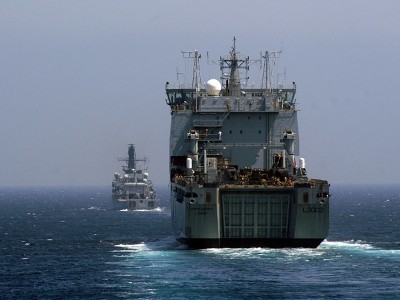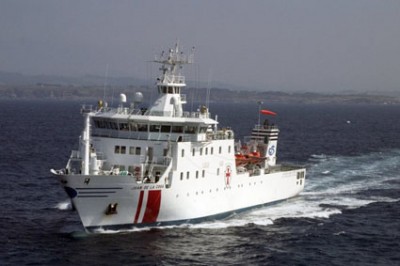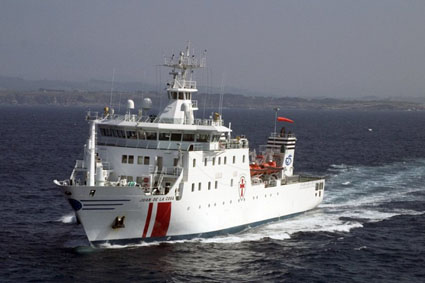In the absence of EUFOR, European countries will provide bilateral aid to Libya... (Maj)

(BRUSSELS2) If the EUFOR Libya operation does not start, one or more States could decide, in concert, to launch a more intensive humanitarian support operation on their own, for example to speed up the evacuation from Misrata of the wounded, nationals from third countries, women and children (maritime deck and medical assistance) or, at the very least, accompanying civilian IOM ships which currently shuttle between Misrata and Benghazi or other ports.
This possibility had been considered for a while (1). But it could come back to life, quite simply for financial reasons. If the bombardments on Misrata continue - the area being deemed dangerous - insurance rates will go up. And we could thus find ourselves in a situation similar to that of Mogadishu, with a compulsory accompaniment of supply or evacuation ships by military ships, both for reasons of security but also quite simply for insurance.
Concretely, it will suffice to detach one or two ships from the NATO maritime embargo mission to ensure this mission, by carrying it out under a national flag. Several States have maritime means in the area and/or have already carried out such an operation during the first events in Libya. France, Italy, Greece, the United Kingdom in particular.
A legal framework already exists and allows this action

From a legal point of view, it is not then necessary to go through OCHA. The body of existing international law (Security Council resolutions and/or Geneva Conventions) seems sufficient.
The UN Security Council has, in fact, already not only authorized these actions but has even recommended them, asking the "Member States, acting together and in cooperation with the Secretary-General, to facilitate and support the return of humanitarian agencies and to make humanitarian and related assistance accessible to the Libyan Arab Jamahiriya" (§ 26 1970 resolution). He authorized the use of force"to protect populations and civilian areas threatened with attack in the Libyan Arab Jamahiriya, including Benghazi, while excluding the deployment of a foreign occupation force in any form whatsoever and on any part of Libyan territory" (§ 4 1973 resolution). The ban on the deployment of an occupying force does not appear to be aimed at the deployment of a few intended military personnel. For the form, it will suffice for a notification to the Secretary General of the UN informing him of the means employed.
The guidelines (MCDA) - which limit the use of military means "as a last resort" - to which OCHA, certain specialists and certain NGOs refer do not seem to me to be applicable in this case. Is they concern the use of military or civil protection means in the event of disasters (for example the earthquake in Haiti or the famine in Somalia). Is they apply to complex situations which fairly strictly define the last resort (no civilian means available and humanitarian needs). The whole question is whether in Misrata these two conditions are met. According to several diplomats, local politicians, they are fulfilled. According to OCHA and NGOs like Oxfam (which are not there), no. History will judge... Anyway, this debate remains philosophical. Because, in no case, the MCDAs do not supplant the other existing international instruments. They have only an indicative value where others have binding force (Security Council resolutions or international conventions). In this case, it is therefore the Geneva Conventions - which Libya has ratified, including the two 1997 protocols - to which it is better to refer. (*) The real question is to have a clear assessment of the needs on the ground and to know how the use of military means will not harm either on the one hand the action of force under the aegis of the UN, nor humanitarian operations carried out by international organizations and NGOs.
The Geneva Conventions prescribe the protection of the wounded or civilians in the conflict according to well-defined procedures (impartiality of treatment, obligation of passage, possibility of creating neutralized zones for civilians, marking of rescue teams, etc.). Although they do not allow the escort of humanitarian ships by the belligerents, they in no way prohibit the parties to the conflict from intervening in a neutral manner to provide care or assist the civilian population. On the contrary, they even encourage and provide for it, in particular prohibiting firing from land on a hospital ship, duly signaled by the Red Cross or the Red Crescent, and obliging each of the belligerents - on the one hand, the government of Tripoli; on the other hand, the CNT in Benghazi and the NATO forces — to work for the protection of civilians and the wounded.
NB: the non-belligerents (the European Union) have thus set themselves prohibitions which do not exist anywhere in international law and put them in a position to act less than the belligerents. It's paradoxical, it's European... 🙂
Read also: Italy and France will ensure the security of humanitarian operations to Libya
(*) Update. Clarification on MCDAs and the mandatory value of these rules. For the list of texts signed by Libya, see here


